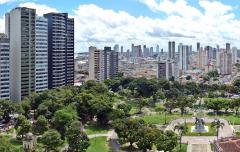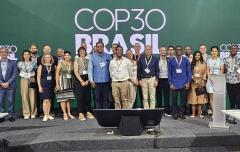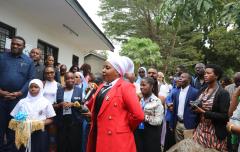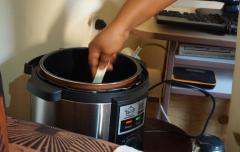At COP30, Global Platform Launches to Accelerate Clean Cooking in Schools Worldwide
Belém, Brazil - 16 November 2025 – The Platform for Clean Cooking in Schools was launched at COP30 as a key part of the COP30 Presidency's Action Agenda. This Plan to Accelerate Solutions for Clean Cooking in Schools (PAS) - links energy and food system transitions globally. The Platform brings ambition and planning with policy and finance to deliver impact – creating conditions to mobilise support across the board to accelerate a clean cooking transition in schools. This Platform supports the School Meals Coalition and its goals – a global alliance of governments and partners working to ensure every child has access to school meals that are healthy and nutritious – while strengthening the role of schools as catalysts for community-wide energy transitions.
The platform brings together partners led by Sustainable Energy for All (SEforALL) together with the World Food Programme (WFP), the School Meals Coalition, UKAid - Modern Energy Cooking Services (MECS) Programme, the Government of Iceland, the Middle East Green Initiative - Forward7, Global Platform for Action (GPA) and Lightrock.
With schools serving meals to more than 450 million children daily, they are the second-largest consumers of biomass energy after households. In many low- and middle-income countries, particularly across sub-Saharan Africa, traditional cooking methods still rely heavily on traditional fuels such as firewood or charcoal on open fires and traditional stoves, exposing students and staff to harmful smoke and negative health impacts – while driving deforestation and contributing to the climate crisis.
At a time when 2.1 billion people still lack access to clean cooking, leading to 3.2 million premature deaths each year, clean cooking in schools offers a transformative solution - linking food and energy systems as a scalable solution to deliver nutritious school meals powered by sustainable energy solutions for every child. The Platform will serve as a flagship initiative to bring together governments, financiers and delivery partners to mobilize resources, scale innovation and align policies that accelerate clean cooking in schools.
Clean cooking in schools directly contributes to COP30 Action Agenda, under the axis, Transitioning Energy, Industry, and Transport, with the key objective for universal access to energy. From Belém, the PAS will move quickly into implementation – building on actions underway in 10 countries, with the aim to scale to another 10 countries by 2026, reaching global scale by 2030.
Quotes
Dan Ioshpe, COP 30 Climate High-Level Champion, Brazil: "By transforming the way clean cooking in schools works, we can improve health, protect forests, and empower the next generation to thrive in a more sustainable world. The Global Platform for Clean Cooking in Schools exemplifies the kind of solution we want to highlight—one that connects climate action directly with millions of people on the ground. This is a concrete plan to ensure access to clean cooking, accelerating progress in the spirit of the Action Agenda."
H.E. Ambassador María Erla Marelsdóttir, Climate Ambassador at the Ministry of Foreign Affairs of Iceland: “The Government of Iceland is pleased to join the Platform for Clean Cooking in Schools - an initiative that directly benefits women and girls by improving the health and working conditions of cooks, who are typically women—and reducing the burden of collecting traditional fuels like firewood. This is an issue of particular importance to the Government of Iceland as a strong gender advocate.”
Hon. Naisa T. Tuinaceva, Assistant Minister, Public Works, Meteorological Services & Transport, Fiji: “The launch of this global platform is a major step forward. It gives Fiji and other small island nations a vehicle to share experiences, access technical expertise, and mobilize resources. Most importantly, it supports our efforts to move from isolated pilots to widespread implementation across all schools.”
Prof. Peter Lawrence Msoffe, Deputy Permanent Secretary, Vice President’s Office (Environment), the United Republic of Tanzania: “The sixth phase government under H.E. Dr Samia Suluhu Hassan has set an ambitious target of ensuring that clean cooking is applied by 80% of the population by 2034. Clean cooking in schools will not only contribute to the achievement of the target but will also create a new generation of adopters who have witnessed clean cooking in their schools.”
Eng. Mohammed Al-Tayyar, Program Director, Middle East Green Initiative – Forward7, OSP: “The Middle East Green Initiative’s Forward7 stands ready to work with our partners to extend clean cooking solutions globally. Through Forward7, we aim to drive the ambition, investment, and regional leadership needed to ensure a clean cooking transition that leaves no community behind.”
Damilola Ogunbiyi, CEO and Special Representative of the UN Secretary-General for Sustainable Energy for All (SEforALL): “Clean cooking is a cornerstone of a just energy transition. Schools are the heart of communities and if we can make every school a clean cooking school, we can accelerate change everywhere. The Platform will ensure that policy ambition is matched with financing and delivery to make this vision real.”
Stanlake J.T.M. Samkange, Director for Multilateral and Programme Country Partnerships, World Food Programme (WFP): “Every child deserves a nutritious meal that does not harm their health or the planet. WFP has long championed the power of school meals to transform lives. The new Platform for Clean Cooking in Schools brings together partners to ensure those meals are prepared safely and sustainably.”
María José Rojas, Head of the School Meals Coalition Secretariat, hosted by WFP: “Clean cooking is essential to delivering safe, nutritious meals to every child, every day. The Platform for Clean Cooking in Schools strengthens the School Meals Coalition’s mission by helping governments and their partners transform school meal systems - ensuring meals are prepared in environments that support children’s health, learning and well-being."
Prof. Ed Brown, Research Director, Modern Energy Cooking Services (MECS) Programme: “This Platform represents the next frontier in modern energy transitions. By focusing on schools, we can deploy scalable solutions that reduce emissions, save time and resources and demonstrate the real-world benefits of modern cooking technologies.”
Dr Iwona Bisaga, Global Clean Cooking Lead, Global Platform for Action (GPA) Coordination Unit & NORCAP: “The GPA is thrilled to join the Platform for Clean Cooking in Schools. As the global initiative advancing sustainable energy access in displacement and fragile settings, we look forward to strengthening collaboration on this critical agenda. Building on SOLCO and our delivery partners’ work across Sub-Saharan Africa, we aim to ensure that efforts to energise school meals also include displaced communities.”
Hanaan Marwah, Executive Director, Energy Access Value Creation, Lightrock: “Community institutions such as schools are crucial catalysts in driving the transition to modern and healthy cooking fuels and technologies. However, the energy required for this daily necessity has been left out of energy access discussions for far too long, delaying necessary actions to enhance health and educational outcomes. Lightrock is delighted to add its voice to those actively advocating for this transition and taking practical steps to make modern cooking energy a reality."
Media Contacts:
Sustainable Energy for All
Sherry Kennedy
Communications Director, Sustainable Energy for All (SEforALL)
Email: sherry.kennedy@seforall.org
Tel: +436764862425
WFP and School Meals Coalition Secretariat Media Contact
Charlotte Masiello-Riome
Communications & External Engagement Officer
Communications Lead
Email: charlotte.masiello@wfp.org




